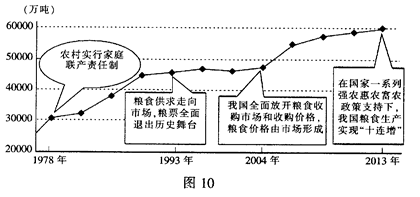( 26 分)阅读材料,完成下列问题。
材料一 1978 年——2013 年我国粮食产量及政策变化图(万吨)

材料二 统计数据显示,从 2009 年起,我国粮食总体转为净进口。 2013 年 12 月召开的中央农村工作会议强调,我国是个人口众多的大国,解决好吃饭问题始终是治国理政的头等大事,稳定国内粮食价格,能一定程度抑制通货膨胀,保持经济持续、健康、稳定发展;中国人的饭碗任何时候都要牢牢端在自己手上。一个国家只有立足粮食基本自给,才能掌握粮食安全主动权,进而才能掌控经济社会发展这个大局。
材料三 保障粮食安全首先必须守住“耕地”红线。而随着工业化、城镇化的推进,我国每年减少耕地达600 多万亩。与此同时,随着征地规模和被征地农民数童的逐年增加,引发的社会矛盾也逐年增多,导致涉及征地的信访居高不下,个别地区群体事件时有发生:分析人士指出,“这既与现行法律法规执行不到位有关,也与一些地方政府征地范围过宽、征地补偿标准偏低、安置方式单一、社会保障不足、有效的纠纷调处和栽决机制缺乏有关”。
(l)请描述材料一中我国粮食生产呈现的态势。( 1 分)并分析其经济原因。( 9 分)联系材料二,从《 经济生活 》角度简要说明保障粮食安全对我国经济发展的意义。( 4 分)
(2)运用《政治生活》“为人民服务的政府”的有关知识,分析说明地方政府应如何避免材料三中出现的问题。( 12 分)
(1)态势:总体呈现增长态势(在波动中增长的态势)(1分)经济原因:①通过改革实行家庭联产承包责任制,极大解放和发展了农村生产力;(3分)②充分发挥市场的基础性调节作用,激发和调动了农民种粮积极性;(3分)③国家加强宏观调控,综合运用经济、法律和行政手段进行调控,出台了一系列强农惠农富农政策,促进了农业和粮食生产发展。(3分)意义:①有利于稳定国内粮食价格,抑制通货膨胀,保持经济持续、健康、稳定发展(2分);②有利于防范经济风险,维护国家经济安全。(2分)
(2)①坚持依法行政,提高行政管理水平。遵守国家有关法律法规,严格规范征地行政行为,严禁滥用征地权。(4分)②审慎行使权力,科学民主决策。增强征地决策透明度和公众参与度,在征地补偿、安置方式、社会保障等方面统筹考虑,系统设计、协调推进,保障被征地农民合法权益。(4分)③自觉接受监督,打造“阳光政府”。完善信息公开制度和办事公开制度,切实保障人民群众对征地的“知情权、参与权、表达权和监督权”。(4分)
题目分析:(1)本题考查经济生活的相关知识。首先第一问,要求描述材料一中我国粮食生产呈现的态势。回答本题难度不大,考生只要根据图表中的内容加以用规范化的语言描述出来即可。通过分析,不难看出,总体呈现增长态势。然后回答原因,考查学生调动和运用知识的能力。我国粮食产量的增加的原因是多方面的,考生可以从农村生产关系的变革、市场在资源配置中的决定性作用、国家的宏观调控等方面回答。第三问,回答保障粮食安全对我国经济发展的意义。考查学生从材料中获取关键信息的能力。材料中强调了通货膨胀、粮食基本自给等方面,所以考生可以从有利于稳定国内粮食价格,抑制通货膨胀、有利于防范经济风险,维护国家经济安全等方面回答。
(2)本题考查政治生活的相关知识。知识指向明确,即回答政府的相关知识。考查学生调动和运用知识的能力。材料三中主要强调了涉及征地的信访居高不下,个别地区群体事件时有发生,所以政府要坚持依法行政,提高行政管理水平;审慎行使权力,科学民主决策;自觉接受监督,打造“阳光政府”。完善信息公开制度和办事公开制度,切实保障人民群众对征地的“知情权、参与权、表达权和监督权”。
